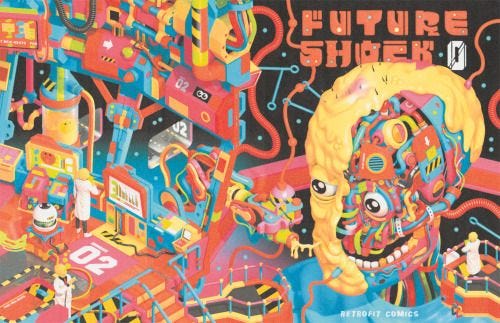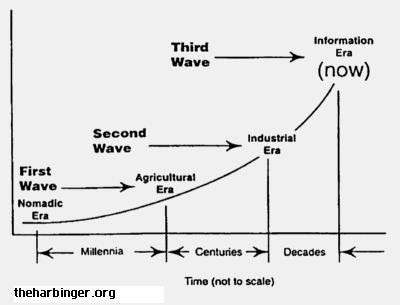
The best exercise to understand the present is to look back into the past, specifically early in the seventies, Mr.Toffler wrote the prophetic 1970 best seller and other books anticipating how people would deal with technological changes from every corner of the globe, he concluded that the convergence of science, capital and communications was producing such swift change that it was creating an entirely new kind of society.
The author and journalist Alvin Toffler saw this great wave coming, when he published “Future Shock” in 1970. He died recently, at the age of 87, having spent half his life living fully in the future.
In fact today this term has been adapted to the new wave labeled as a Digital Transformation, when the real seed comes from this visionary and futurists not understood in his time and glorified today.
On the other hand Orson Welles filmed also another documentary film with the same name, he tried to understand what was the message behind the scene.
As a definition “Future shock is the shattering stress and disorientation that we induce in individuals by subjecting them to too much change in too short a time,” it feels like we are living in the future now, it’s because, in a sense, we are.
Prior to the Industrial Revolution, technology advanced slowly, helter-skelter. In the two centuries since, mass production, electrification, and an explosion in technological progress mean that changes which used to take decades can take place in years and months.

In September 2002, Popular Science asked thoughtful people if science can make us more secure, and Toffler’s answer stands out. “We’re entering into a new way of life, and we’re just as ignorant of this new environment as the paleolithic warrior was in his environment”, he said, “I think we have to accept risk in our lives. You cannot eliminate all risk without being dead.”
Man has a limited biological capacity for change. When this capacity is overwhelmed it´s in a crash that trigger irrational human reactions.
Most people are definitely unprepared to cope with accelerated rate of change, “future shock” is a time phenomenon, a product of a greatly accelerated rate of change in society, too much change in too short a time affects managers and organizations as well, when change occurs rapidly, the capacity of management to react is strained, creating the danger of future shock, the danger comes from these reactions not for the change itself.
Five are the keys to study the real impact and implications in this discipline that comes from the seventies, consciousness, technology, society, individuals and values.
- Future conciousness … The Future is Now, not “Then”
It has already arrived. Not science fiction, not “tomorrow”, but the extraordinary extent of choice, the rate and complexity of change have provoked future shock. Order and continuity have disappeared from our lives. We can control future shock by learning to make choices to direct our own futures.
- Future and technology … Cybernetic Genesis
The high rate of change symptomatic of shake is linked almost directly to technological progress. No individual can turn it off or turn it back, and no far-sighted person would want to. Irresponsible technology is but one element of an environment out of control. Conscious regulation of technological advancement is called for. we must ask if we need more technology, and if so, under what conditions?
- Future and society … Shattered Structures
Human relationships in today´s society can be characterized as “temporary” at best. Short term involvements, family migrations, high job turnover, social mobility are indicators of fragmentation and loss of a sense of belonging that pervade our lives. despite resistance to change, we live in an environment that is more and more impermanent. The turnover of things ans people in our livesaccelerates as we become a nomadic people in a transient society. Which are the limits of our adaptability?
- Future and the individual … Limits of Adaptability
Abbreviated, compressed, transient relations between people; the feeling we are alone and rootless; tha anxiety, alienation and stress generated by a speeding society signs of despair within the future shocked individual. In a modular world, should our children be trained to “disrelate”?
- Future and values … Humanizing Change
As institutions are forced to change and the impermanent, modular society emerges, standards and values that once influenced our lives disappear. The need to face with change is cofounded by overchoice and the lack of standards on wich to rely in choosing alternatives. The rationality of the total society depends directly on the ability to perceive the world-wide implications of rapid change and develop an imaginative, humane approach to technological progress.
The sensation could be perceptible if you try to understand a traveller who catch a flight and in a few hours change absolutely his behaviour and conditions to a new environment never explored, a sense of disorientation or confusion from being inmersed in a new culture, way of life, or set of attitudes.

Pedro Trillo, Maverick en vizologi.
vizologi.com